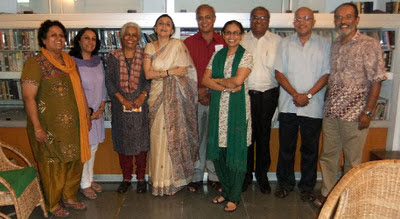Jung Chang and Peter Florence
Jung
Chang settled
in UK after going there to study as one of the first Chinese students
who attend a university in the West. She wrote a personal memoir
about Mao's legacy in China (Wild
Swans),
and then
a biography of Mao with her husband
after 12 years of research, getting the most valuable documents from
Russian archives of what went on in that period.
The
most shocking news was that the great famine of 1958-1961 was
deliberate starvation of the people by sending grain to the
Soviet Union and its satellites because Mao wanted arms; it was paid
in grain to the extent of 7% of China's GDP at the time.
Bringing
along her mother's tiny shoes, Ms Chang demonstrated how half the
population of China for more than 1000 years had been subject to the
torture of foot-binding, all for a theoretical standard of looking
dainty and sexy.
Stalin
backed Mao from the early 1920s, after gauging he was utterly
ruthless, and therefore capable of bringing Communism to China. No
one joined the Party because of Mao's charisma, of which he had
little.
Peter Florence takes questions from the audience
Chang
said she never met as many Mao enthusiasts anywhere in the world as
in India. In the 50s, 60s, 70s, being
pro-Mao was a condonable weakness; but being pro-Mao now is inexcusable ignorance.











































